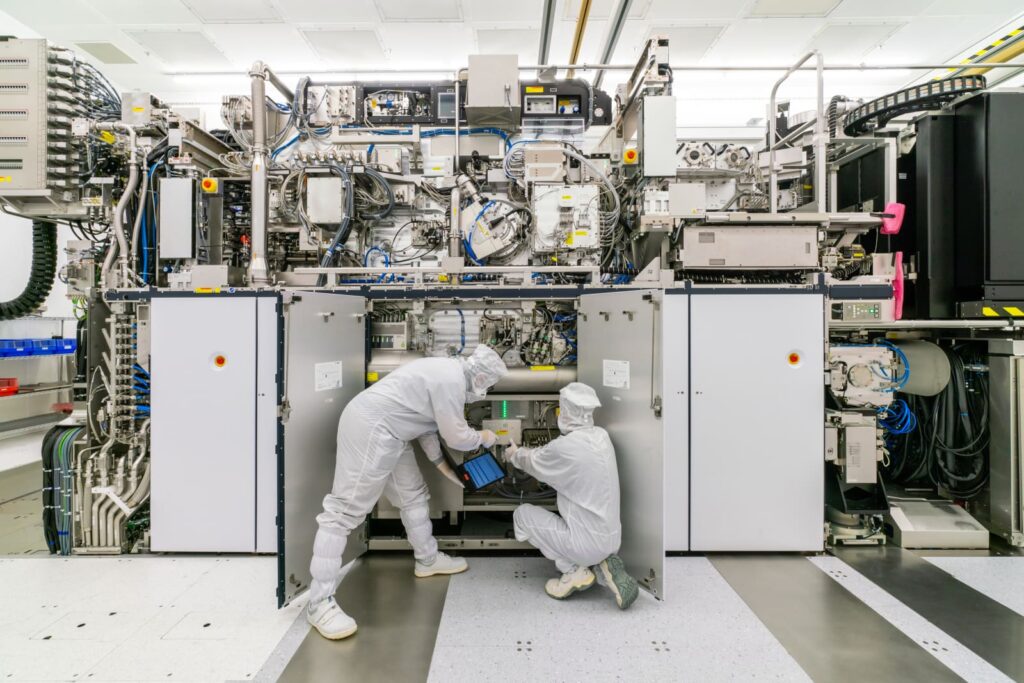The case of the spy German A. highlights the growing tension between industrial security and geopolitics in the global race for semiconductors.
In a plot worthy of a spy thriller, a Russian engineer has been detained in the Netherlands on charges of stealing industrial secrets from some of the world’s most advanced tech companies: ASML, NXP, GlobalFoundries, and TSMC. According to prosecutors, his goal was to provide Russia with the necessary information to expedite the construction of factories capable of producing 28-nanometer chips, a key technology in the current military and strategic context.
The accused, identified as German A., worked for years at high-tech companies in the Netherlands and Germany. His career, discreet and lacking in significant visible achievements, went unnoticed by his colleagues, who described him as a “einzelgänger” — a loner — with limited communication skills. Nonetheless, his time at institutions like IMEC, Mapper, ASML, and NXP allowed him access to sensitive technical documentation that ended up in the hands of Russian intelligence, the SVR.
Confidential Documents and Russian Payments
According to the Dutch prosecution and media such as NRC and Tom’s Hardware, German A. managed to gather a total of 193 confidential documents: 105 from ASML and 88 linked to TSMC. Although they were not complete schematics of machinery, they contained detailed information on production processes, technical guides, and operating diagrams that would have been crucial for setting up a Russian chip factory.
All indications are that A. shared these documents with Russian intelligence through cloud services and encrypted messaging, in addition to physically delivering a USB in Moscow, for which he received a payment of about 40,000 euros. The espionage reportedly began even before the invasion of Ukraine in 2022, according to the prosecution.
A Clear Objective: Manufacturing 28 nm Chips
The documentation obtained would serve to enhance Russia’s ability to produce 28-nanometer chips, a technology considered mature but still essential, especially in military applications such as missiles, drones, or communication systems. In light of the sanctions imposed by the West, Moscow has been desperately seeking alternatives to bypass its technological dependence on the U.S. and Europe.
The case gains relevance as it coincides with the Kremlin’s ambitious plans to have its own semiconductor factories operational before 2030. If confirmed, the stolen information would save Russia years of research and billions in industrial development.

Security Failures and Legal Consequences
Despite limited access to the internal systems of companies like ASML, records reveal that German A. downloaded documentation outside his scope of work in December 2020 without triggering any immediate alerts. This has reignited the debate on the need to bolster internal cybersecurity systems even against threats from within.
The engineer was arrested in August 2024 following an alert issued by the Dutch intelligence service (AIVD). The affected companies — ASML, NXP, and GlobalFoundries — have already pressed charges, while TSMC, although implicated, has avoided making public comments.
The trial began this month in Rotterdam. Despite the seriousness of the facts, Dutch law provides for penalties of 18 to 32 months in prison for economic espionage offenses, a sentence that many analysts consider insufficient given the potential impact of his actions.
Precedents and Vulnerabilities
This is not the first time that companies like ASML or NXP have been targets of espionage operations. In 2022, a former ASML employee with ties to China stole critical information, and in 2023, it was discovered that a Chinese cyber-espionage network had remained inside NXP’s internal network for years.
In response, both companies have strengthened their cybersecurity infrastructure, establishing strict digital compartmentalization between departments and continuous monitoring systems for unusual activities. Nonetheless, this new incident demonstrates that the risk persists, especially when it involves carefully planned human infiltrations.
A Warning for Europe
The case of German A. is a stark reminder of the risks Europe faces in its strategy for technological reindustrialization and digital autonomy. With the war in Ukraine still ongoing and global tensions rising, the protection of intellectual property and the security of industrial assets have become a state matter.
The semiconductor industry, which represents the heart of the digital revolution, has become a strategic battleground where spies are not only seeking military secrets but also the know-how that will determine who will lead the next technological decade.
Via: NRC

